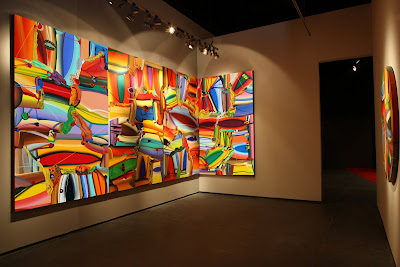Anita Dube declared curator of Kochi-Muziris Biennale 2018
Kochi, March 29: Anita Dube, one of India’s most provocative and versatile contemporary artists, was announced here today as the curator for the fourth edition of the Kochi-Muziris Biennale (KMB) beginning December 2018. The selection is in keeping with the Biennale’s long-standing tradition of being an artist-led exhibition.
The reveal – made by Culture Minister Shri A.K. Balan during the KMB 2016 closing ceremony at Durbar Hall Wednesday evening – followed the unanimous decision made by a high-powered panel of renowned artists and prominent personalities to bring Dube’s unique artistic insights and sensibilities to the Biennale – the largest celebration of contemporary art in South Asia.
“Through three editions, the KMB has gained a reputation for being one of the most important exhibitions of its kind around the world. It is an honour and a very big challenge to be declared curator of this wonderful platform. I am delighted that the jurors thought I can deliver. I accept the responsibility with excitement and humility. It is early days yet and my thoughts will no doubt undergo several changes going forward, but I view this as an opportunity to do something special,” said Dube, who was present at the function.
Dube takes over from Sudarshan Shetty, whose vision for the third edition of India’s only Biennale saw 97 artists from 31 countries showcase their production – across a variety of forms, styles and disciplines – over a 108-day period starting 12/12/16. Spread out across 12 venues, KMB 2016 received more than six lakh visitors.
Based out of the National Capital Region, Dube is renowned for her conceptually rich, politically charged works. An art historian and critic by training and a visual artist in practice, she has been widely exhibited across the Americas, Europe and Asia, including at the first edition of the KMB in 2012. Dube’s practice uses found objects and industrial materials, photography and ‘word architecture’ to critique contemporary socio-political realities.
Her aesthetic idiom, in many ways, reflects her background as a member of the Indian Radical Painters and Sculptors Association – a short-lived but hugely influential collection of artists and art students who rebelled against what they perceived to be the commodification of art in India.
In fact, Dube’s selection comes nearly three decades after she wrote the manifesto of the group’s seminal exhibition ‘Questions and Dialogue’ held in 1987 in the western state of Gujarat – that called for an explicitly radical, socially and politically conscious approach to art making. The group focused on inexpensive materials and found objects to produce works that resisted commercialisation and connected with working-class audiences.
Describing Dube as a ‘thinking artist’, KMB co-founder Bose Krishnamachari said, “Anita’s sensitivity towards materials, incorporating everyday objects derived from informal, craft and industrial sources and spaces, is profound. As is her wordplay and use of mediums, gestures and imageries – all of which will make for varied experiences and resonances in a space as adaptive and accommodating as the Biennale. Her oeuvre features both knowledgeable consideration and skillful melding of the sensibilities and styles of abstractions with real, contemporary concerns. This will doubtless be reflected in her curatorial vision.”
Krishnamachari, who is also President of the Kochi Biennale Foundation (KBF) – the organisers of India’s only Biennale, was part of the ‘Artistic Advisory Committee’ that selected Dube as curator. The other panelists were KBF Secretary Riyas Komu, Velu Vishwanadhan, Sarat Maharaj, Ravi Agarwal, Dayanita Singh, Sadanand Menon, Kavita Singh and V. Sunil.
“Anita’s selection not only reinforces our commitment to having artists at the helm, but also our mission to address contemporary social-political-cultural concerns. Anita is a strong proponent of making art accessible to the public through effective political and social engagement. This is precisely what the Biennale tries to do,” Komu said.
Dube is also a board member at KHOJ, an international artists’ association she co-founded in 1997 in New Delhi. Over two decades, the initiative that began as a modest annual workshop has become one of the most important platforms shining a global spotlight on South Asian art, organising and hosting international ‘itinerant’ workshops, residencies and exhibitions.
Besides KMB 2012, she has been represented in various national and international biennales and festivals such as ‘Biennale Jogja XI’ (Indonesia, 2011), ‘Against Exclusion’ 3rd Moscow Biennale of Contemporary Art (2009), ‘iCon: India Contemporary’, Venice Biennale (Collateral event, 2005), ‘Yokohama Triennale’ (Japan, 2001) and the ‘7th Havana Biennial’ (Cuba, 2000).
Dube was also a participant in the groundbreaking 2009 exhibition, ‘Indian Highway’, an itinerant collective show curated by Hans Ulrich Obrist, Julia Peyton-Jones and Gunnar B. Kvaran, which represented the growing importance of the sub-continent’s creative panorama – especially the vibrancy of its contemporary art scene – and the economic, social and cultural developments in the region over the past 20 years.



